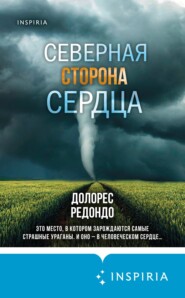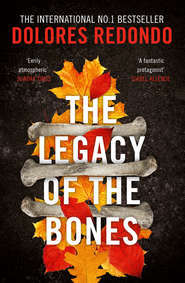По всем вопросам обращайтесь на: info@litportal.ru
(©) 2003-2025.
✖
Offering to the Storm
Автор
Год написания книги
2019
Настройки чтения
Размер шрифта
Высота строк
Поля
Iriarte was soaked to the bone, and as he spoke to Amaia, he kept wiping his brow to stop the water going in his eyes. Deputy Inspector Etxaide appeared out of nowhere with a large umbrella, which he handed to them, then went to help the other officers pacify the crowd.
‘Well, Inspector?’
‘The suspect in the car is Valentín Esparza. His four-month-old daughter died last night while sleeping over at her maternal grandmother’s house. The doctor registered the cause as Sudden Infant Death Syndrome. So far, a tragedy. Except that yesterday, the grandmother, Inés Ballarena, paid a visit to the police station. Apparently, the baby was staying the night with her for the first time because it was the parents’ wedding anniversary, and they were going out to dinner. She was looking forward to it, and had even prepared a room for her. She fed the baby and put her down for the night, then fell asleep in front of the television in the sitting room next door, although she swears the baby monitor was on. She was woken by a noise, and went to look in on the baby – who from the doorway appeared sound asleep. Then she heard the crunch of tyres on gravel outside. She looked through the window in time to see a large, grey car driving away. Although she didn’t see the number plate, she assumed it was her son-in-law, as he has one just like it,’ said Iriarte, with a shrug. ‘She claims she checked the time and it was just gone two in the morning. She thought the couple must have driven by on their way home to see if any lights were on. This didn’t strike her as odd because they live nearby. She thought no more about it, and went back to sleep on the sofa. When she woke up, she was surprised not to hear the baby crying to be fed, so she went into the bedroom where she found the child dead. She was upset, she blamed herself, but when the doctor gave the estimated time of death as between two and three in the morning, she remembered waking up and seeing the car in the driveway. She now believes she was woken by an earlier noise inside the house. When Inés asked her daughter about this, she told her they had arrived home at around one thirty; she doesn’t drink usually, so a glass of wine and a liqueur after the meal had knocked her out. However, when Inés questioned the son-in-law, he became agitated, refused to answer, flew into a rage. He told her it was probably a couple of lovebirds looking for a secluded spot; it wouldn’t have been the first time. But then Inés remembered something else: she keeps her two dogs outside and they bark like crazy whenever a stranger comes near the house, but they didn’t make a sound last night.’
‘What did you do next?’ asked Amaia.
Whether it was because they were intimidated by the police presence or simply wanted to get out of the rain, the crowd had retreated to the covered entrance of the funeral parlour. A woman at the centre of the huddle was embracing another, who was screaming and sobbing hysterically. It was impossible to make out what she was saying.
‘The woman screaming is the mother, the one with her arms around her is the little girl’s grandmother,’ Iriarte explained, following Amaia’s gaze. ‘Anyway, as I was saying, the grandmother was in a terrible state. She couldn’t stop crying while she was telling me her story. To begin with, I thought she was probably just trying to find an explanation for something that was difficult to accept. This was the first time they let her babysit, her first grandchild, she was distraught …’
‘But?’
‘But, even so, I called the paediatrician. He was adamant: Sudden Infant Death Syndrome. The baby was premature, her lungs weren’t properly formed, and she’d spent half of her short life in the hospital. Although they’d discharged her, this past week the mother had brought her to the surgery with a cold – only a sniffle, but in a premature, underweight baby, the doctor had no doubt about the cause of death. An hour ago, Inés turned up at the station again, insisting the girl had a mark on her forehead – round, like a button – which wasn’t there earlier. She said that when she pointed it out to her son-in-law, he snapped at her and insisted they close the coffin. So I decided to take a look for myself. As we entered the funeral parlour, we bumped into the father, Valentín Esparza, on his way out. He was carrying that rucksack’ – Iriarte pointed to the wet bundle sitting in a puddle – ‘and something about the way he was holding it struck me as odd. Not that I carry a rucksack myself, but it didn’t seem right.’ He clasped his hands to his chest to imitate the posture. ‘The minute he saw me, he turned pale and started to run. I caught up with him next to his car, and that was when he started to yell, telling us to leave him alone, saying he had to finish this.’
‘To take his own life?’
‘That’s what I thought. It occurred to me he might have a weapon in there …’
Iriarte crouched down beside the rucksack, giving up the shelter of the umbrella, which he placed on the ground as a screen. He opened the flap, pulling the toggle to loosen the drawstring. The little girl’s dark, wispy hair revealed the soft spot on her head; her skin had that tell-tale pallor, although her mouth, slightly open, retained a hint of colour, giving a false impression of life, which held them transfixed until Dr San Martín leaned in, breaking the spell.
While the pathologist removed the sterile wrapping from a swab, Iriarte gave him a summary of what he had told Amaia. Then San Martín crouched next to the child’s body and gently used the swab to remove the make-up that had been hastily applied to the bridge of the baby’s nose.
‘She’s so tiny.’ The sorrow in the usually imperturbable pathologist’s voice made Iriarte and Amaia look at him in surprise. Conscious of their eyes on him, he immediately busied himself examining the mark on the child’s skin. ‘An extremely crude attempt to cover up a pressure mark. It probably occurred at the precise moment when she stopped breathing, and is only visible to the naked eye now that lividity has set in. Give me a hand, will you?’ he said.
‘What are you going to do?’
‘I have to see all of her,’ he replied, with an impatient gesture.
‘Not here, please,’ said Iriarte. He indicated the crowd outside the funeral parlour. ‘You see those people? They’re the baby’s relatives, including her mother and grandmother. We’ve had enough difficulty controlling them as it is. If they see her dead body lying on the ground, they’ll go crazy.’
‘Inspector Iriarte is right,’ said Amaia, glancing towards the crowd then looking back at San Martín.
‘Very well, but until I have her on my slab I can’t tell you if there are any other signs of violence. Make sure you are thorough when you process the crime scene; I remember working on a similar case, where a mark on a baby’s cheek turned out to be made by a button on a pillowcase. Although I can give you one piece of information that might help.’ San Martín produced a small digital device from his Gladstone bag, holding it up proudly. ‘A digital calliper,’ he explained, pulling apart the two metal prongs, and adjusting them to measure the diameter of the mark on the baby’s forehead. ‘There you are,’ he said, showing them the screen. ‘The object you’re looking for is 13.85 millimetres in diameter.’
They stood up, leaving the forensic technicians to place the rucksack inside a body bag. Amaia turned to see Judge Markina standing a few metres away, watching in silence. No doubt San Martín had notified him. Beneath his black umbrella, and in the dim light seeping through the leaden clouds, his face looked sombre; even so, she registered the sparkle in his eye, the intensity of his gaze when he greeted her. Although the gesture was fleeting, she looked nervously at San Martín then at Iriarte to see if they had noticed. San Martín was busy giving orders to his technicians and outlining the facts to the legal secretary beside him, while Iriarte was keeping a close watch on the relatives. The rumour had spread among them, and they began angrily to demand answers even as the mother’s howls of grief grew louder and louder.
‘We need to get this guy out of here now,’ declared Iriarte, motioning to one of the officers.
‘Take him directly to Pamplona,’ ordered Markina.
‘I’ll get a police van to move him there by this afternoon at the very latest, your honour. In the meantime, we’ll take him to the local police station. We’ll meet there,’ Iriarte said to Amaia.
She nodded at Markina by way of a goodbye, then started towards her car.
‘Inspector … Do you have a moment?’
She stopped in her tracks, wheeling round only to find him standing beside her, sheltering her with his umbrella.
‘Why didn’t you call me?’ This wasn’t exactly a reproach, or even a question; it had the seductive tone of an invitation, the playfulness of flirtation. The grey coat he wore over a matching grey suit, his impeccable white shirt and dark tie – unusual for him – gave him a solemn, graceful air, moderated by the lock of hair tumbling over his brow and the light covering of designer stubble. Beneath the canopy of the umbrella she felt herself being drawn into a moment of intimacy, conscious of the expensive cologne emanating from his warm skin, his intense gaze, the warmth of his smile …
Suddenly, Jonan Etxaide appeared out of nowhere.
‘Boss, the cars are all full. Could you give me a lift to the police station?’
‘Of course, Jonan,’ she replied, startled back to reality. ‘If you’ll excuse us, your honour.’
Having taken her leave, she made her way towards the car without a backward glance. Etxaide, however, turned once to contemplate Markina, who was standing where they had left him. The magistrate responded with a wave.
4 (#ua3e92a81-94f0-5908-bd3c-8a54345460b6)
The warmth of the police station hadn’t succeeded in bringing the colour back to Iriarte’s cheeks, but at least he’d managed to change out of his wet clothes by the time Amaia arrived.
‘What did he say?’ she asked. ‘Why was he taking her body?’
‘He hasn’t said a word. He’s sitting curled up in a ball in the corner of his cell, refusing to move or speak.’
She made to leave, but when she got to the door she turned to face the inspector.
‘Do you think Esparza’s behaviour was motivated by grief, or do you believe he is involved in his daughter’s death?’
‘I honestly don’t know,’ said Iriarte. ‘This could be a reaction to losing his daughter, but I can’t rule out the possibility he was trying to prevent a second autopsy, fearing it would confirm his mother-in-law’s suspicions.’ He fell silent, then sighed. ‘I can’t imagine anything more monstrous than harming your own child.’
The clear image of her mother’s face suddenly flashed into Amaia’s mind. She managed to thrust it aside only for it to be replaced by another, that of the midwife, Fina Hidalgo, breaking off newly sprouted shoots with a dirty fingernail, stained green: ‘The families mostly did it themselves; I only helped occasionally when they couldn’t bring themselves to destroy the fruit of their womb, or some such nonsense.’
‘Was the girl normal, Inspector? I mean, did she suffer from brain damage or any other disabilities.’
Iriarte shook his head. ‘Besides being premature, the doctor assured me she was a normal, healthy child.’
The holding cells at the new police station in Elizondo had no bars; instead, a wall of toughened glass separated them from the reception area, allowing each compartment to be viewed from outside, and making it possible for the occupants to be filmed round the clock. Amaia and Iriarte walked along the corridor outside the cells, all of them empty save for one. As they approached the glass, they could see a man crouched on the floor at the back of the cell between the sink and the toilet. His arms were looped around his knees, his head lowered. Iriarte switched on the intercom.
‘Valentín Esparza.’
The man looked up.
‘Inspector Salazar would like to ask you a few questions.’
He lowered his face again.
‘Valentín,’ Iriarte called out, more firmly this time, ‘we’re coming in. No need to get agitated, just stay calm.’
Amaia leaned towards Iriarte. ‘I’ll go in alone, I’m in plain clothes, I’m a woman, it’s less intimidating …’
Iriarte withdrew to the adjacent room, which was set up so that he could see and hear everything that went on.
Amaia entered the cell and stood facing Esparza. After a few seconds, she asked: ‘May I sit down?’
He looked at her, thrown by the question.











